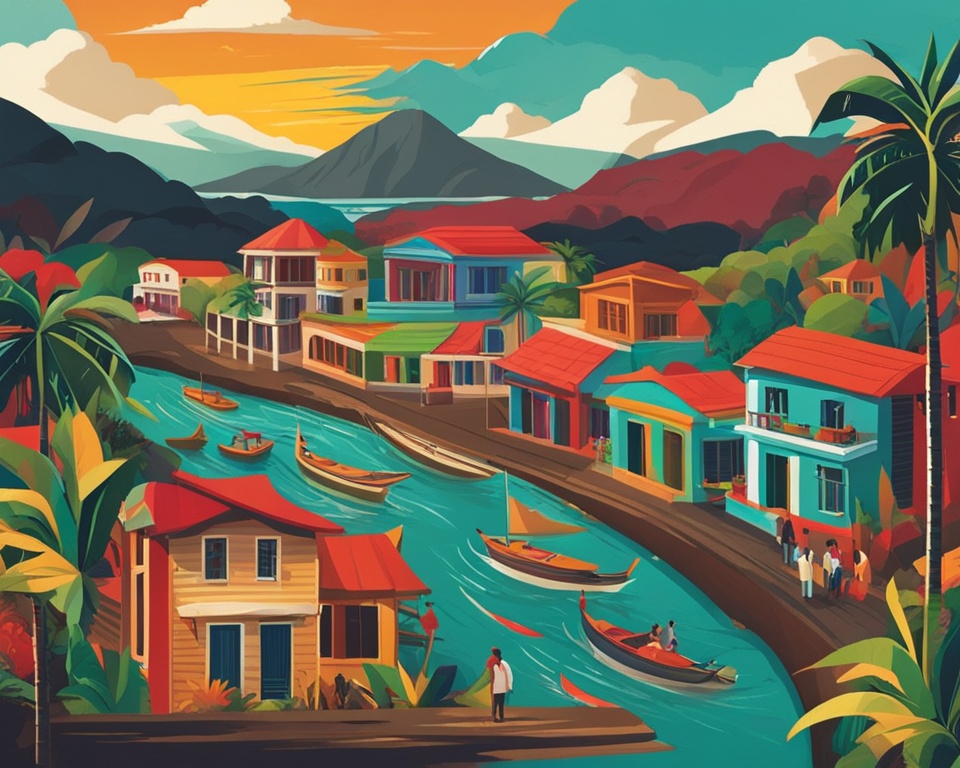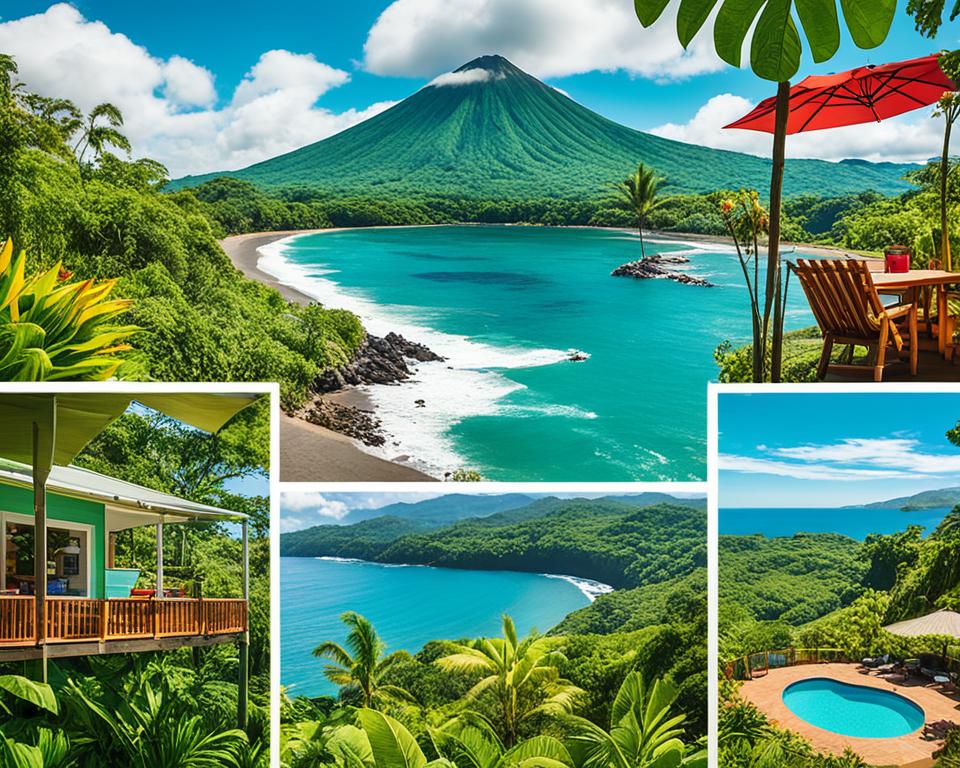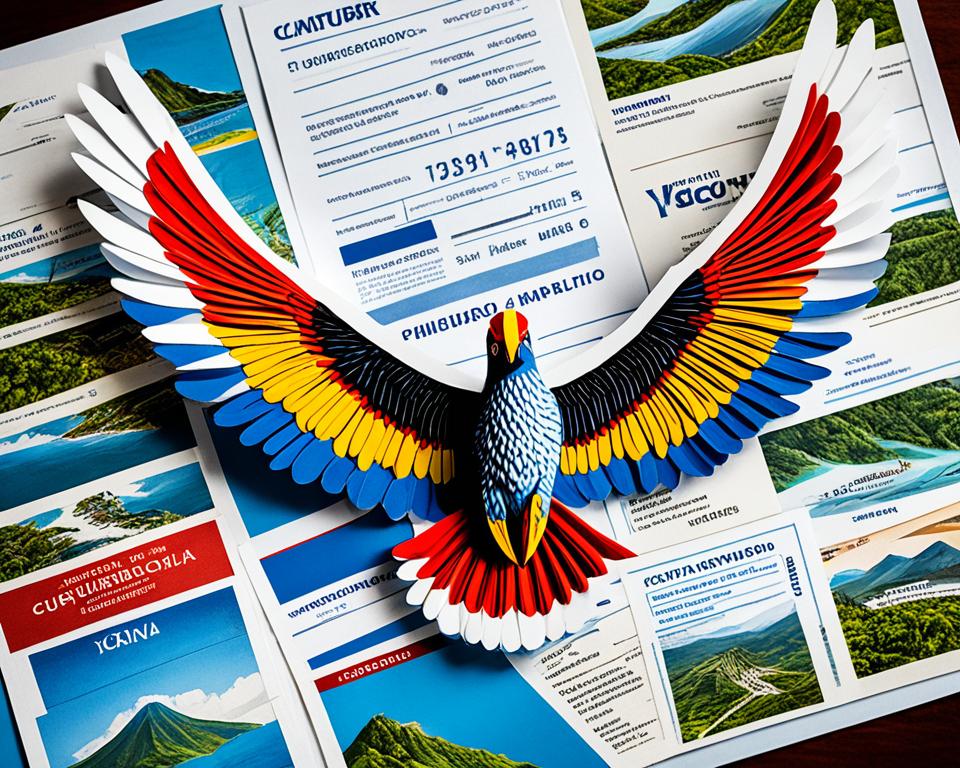As a hub for international workers and service providers, Costa Rica has introduced Law No…

Costa Rica Immigration & Residency Categories With CRIE
Many people dream of living in a tropical paradise. But what’s the best way to make that dream come true in Costa Rica? For over 20 years, the Costa Rica Immigration Experts (CRIE) have helped thousands of people move here. They offer various residency options to make sure newcomers enjoy their new life.
There are many ways to live in Costa Rica, like retirement and investment programs. CRIE makes applying for residency easy with their help. They also offer legal advice and document preparation to make the move smoother.
Key Takeaways
- Over 20 years of experience in assisting clients with Costa Rica immigration processes.
- Thousands of successful residency applications completed through CRIE.
- Various residency categories available, including retirement, investment, and work options.
- Personalized services, including document procurement and translation, enhance the immigration journey.
- Understanding of essential financial requirements for each residency category is crucial.
Introduction to Costa Rica Immigration
For those thinking about moving to Costa Rica, it’s key to understand the immigration process. This country is famous for its stunning views and welcoming vibe. It’s becoming a top choice for many, thanks to its various residency options.
These options cater to retirees, investors, and those with steady jobs. The first step is to pick the right residency type for your life. Investors need to put over $150,000 into a business or property. Retirees must have a pension of more than $1,000 a month. And, if you earn $2,500 monthly, you can apply too.
It’s important to know that getting temporary residence can take 10 to 14 months. This card is valid for two years. Before getting your local ID card (DIMEX), you must register with the Costa Rican Social Security Agency (Caja) and pay monthly premiums.
Costa Rica has made it easier to get residency with new laws. Knowing the legal requirements and options is crucial for a smooth move. This knowledge helps you confidently go through the immigration process, making your move smoother.

Understanding Costa Rica Residency Options
For those thinking about moving to Costa Rica, it’s key to know the residency options. There are three main types: the Pensionado, Rentista, and Investor visas. Each is for different needs and situations.
The Pensionado Visa is for retirees. You need to show you have a steady pension income of at least $1,000 a month. It’s a great choice for seniors wanting a warm climate and lower living costs.
The Rentista Visa is for people without pensions but with a lot of money. You must prove you have a monthly income of $2,500 for two years or a $60,000 bank deposit in Costa Rica. This visa is good for professionals and digital nomads who want flexibility.
The Investor Visa is for those who want to invest in Costa Rica. You need to invest at least $150,000 in a business or property here. This option lets you help the economy and get residency through your investment.
Each residency option has its own set of requirements. You’ll need a valid passport, birth certificate, and other documents like a criminal background check and a medical certificate. Remember, it can take six months to a year to process your application, and you might need more information later.

Exploring Costa Rica Immigration and Residency Categories
Costa Rica has different paths for those wanting to live there, each with its own rules and perks. It’s key to know the types of residency available. The main ones are Pensionado, Rentista, and Inversionista, fitting various financial situations and lifestyles.
Types of Residency in Costa Rica
The Pensionado visa is for retirees with a monthly pension of at least $1,000. It lets them live in a tropical paradise. If you don’t have a pension, the Rentista visa might be for you. It needs a steady income of $2,500 for two years.
For investors, the Inversionista visa is an option. It requires a $200,000 investment in Costa Rica. This can lead to business chances in real estate, tourism, and renewable energy.
Financial Requirements for Residency
Passing the financial checks is key to getting residency. You must show you can support yourself. This means proving your income or investment plans.
Each visa type has its income or investment needs. But, you’ll also face initial fees of about $251 and processing fees of around $433. You’ll need documents like a background check, birth certificate, and passport copy to apply.
Knowing the financial parts well boosts your chances of getting in. If you’re unsure, getting help from experts like CRIE is a good idea. They can guide you through the process and make sure your documents are right.

Costa Rica Immigration Requirements
Starting a residency application in Costa Rica requires careful preparation. For those planning to live here, knowing what you need makes the process easier. You’ll need to look at documents, health checks, and background checks.
Key Documentation Needed for Residency Applications
To apply for residency, you must collect certain documents. These include:
- Valid Passport
- Birth Certificate
- Marriage Certificate (if applicable)
- Police Clearance Certificate (background check)
- Medical Examination Results (health check)
- Proof of Income or Investment
Make sure all documents are apostilled and no older than six months. If you’re from the U.S., get your criminal record from the FBI. Canadians should get theirs from the RCMP. Costa Rica Immigration Experts can help with your application, making sure everything is ready for quick processing.
Health and Background Checks
Health and background checks are key for residency. You’ll need a doctor’s check-up to show you’re healthy. Also, a clean criminal record is required to prove your good character.
After getting your documents ready, pass these checks for a smoother application. Costa Rica has three main residency types: Pensioner, Rentista, and Investor. Each has its own financial needs and documents.

Navigating the Costa Rica Visa Process
The Costa Rica visa process might look complex at first. But, knowing the steps can make it easier. First, pick the right residency visa that suits your needs. Then, gather your documents, like a filled application form, a passport with six months left, proof of money, and a recent photo.
Some visas have special requirements. For example, a work visa needs a job offer, and a student visa requires an acceptance letter from a school in Costa Rica. Each visa type, like rentista, pensionado, and inversionista, has its own rules.

After gathering all your documents, you might need to get your fingerprints taken or have an interview. Waiting for approval can take a few months to a year. It’s important to start early. Getting help from experts, like Costa Rica Immigration Experts (CRIE), can make your application stronger.
Benefits of Obtaining Residency in Costa Rica
Getting residency in Costa Rica brings many perks that improve your life and wallet. The benefits of obtaining residency cover many parts of your daily life. This makes it a great choice for many people moving abroad.
Access to Healthcare and Education
One big plus is getting into the healthcare in Costa Rica. You can use the public health system for top-notch medical care at lower costs than in the U.S. There’s a wide network of hospitals and clinics, so quality healthcare is easy to find. Plus, there are great schools and universities for families.
Living Conditions and Cost of Living for Expats
The cost of living for expats is often lower than in many U.S. cities. Monthly costs for living comfortably range from $1,600 to $2,500. This includes rent, utilities, and other basic needs. Costa Rica’s beauty and lower cost of living make it a top choice for those moving abroad. New laws have made it easier to get residency by lowering the investment to USD $150,000. They also offer tax breaks on things like homes, cars, and real estate.

There are more benefits too. Costa Rica uses a territorial tax system. This means you only pay taxes on what you earn in Costa Rica. You can also upgrade to different residency types for more benefits. This lets you enjoy a great life in this lovely country.
Working with Costa Rica Immigration Experts (CRIE)
People wanting to live in Costa Rica can greatly benefit from experts in immigration. CRIE offers special help for moving to Costa Rica. They make the process easier by understanding immigration laws and guiding clients step by step.
Role of CRIE in the Immigration Process
CRIE is key in helping clients with their immigration needs. They offer many services, including:
- Helping to see if you qualify for different residency types, like the Pensionado or Rentista programs.
- Helping with all the paperwork needed.
- Legal advice to follow immigration laws.
- Making the application process faster and easier.
Working with immigration experts in Costa Rica can prevent mistakes and improve your chances of getting residency. CRIE’s team is very experienced. They help people from different backgrounds, like investors or digital nomads.
Testimonials and Success Stories
Many people have given great feedback about CRIE. They talk about how professional and quick the services are. People say applying for residency was easier thanks to CRIE.
There are many success stories. They show how people moved to Costa Rica with CRIE’s help. This support makes the process faster and gives people confidence in their new life in Costa Rica.

Conclusion
Looking into Costa Rica’s immigration options is key for those thinking of moving there. There are many ways to live in Costa Rica, from investing to retiring or starting a business. Knowing what each option requires and its perks makes moving there easier.
Costa Rica Immigration Experts (CRIE) make the immigration process easier. They help especially with self-employed people and entrepreneurs wanting to make a mark in Costa Rica. CRIE helps with everything from the National Registry to Social Security, making it a crucial ally.
More people want to move to Costa Rica, and having CRIE’s help can make it happen. They assist with everything from getting permanent residency to moving from a temporary status. Their knowledge makes the journey to living in this lively country smoother.
For the Pensionado program, you need a monthly pension of at least
FAQ
What are the main categories of residency available in Costa Rica?
Costa Rica offers three main residency types. These include the Pensionado program for retirees, the Rentista category for those with steady income, and the Investor visa for investors.
What are the financial requirements for the different residency categories?
For the Pensionado program, you need a monthly pension of at least $1,000. Rentistas must show a monthly income of $2,500 or a two-year deposit of $60,000. Investors must invest at least $200,000 in real estate or businesses.
What documents are required for a residency application in Costa Rica?
You’ll need a valid passport, birth certificate, police clearance certificate, medical exam results, and proof of income or investment. Some documents might need an apostille or legalization.
How long does the Costa Rica visa process take?
The visa process can take several months to a year. It’s best to start early to avoid delays.
What are the benefits of obtaining residency in Costa Rica?
Living in Costa Rica means getting access to a good public healthcare system and quality education. It also offers a lower cost of living than many places in North America, making it great for expats.
How can Costa Rica Immigration Experts (CRIE) assist with the immigration process?
CRIE helps with the complex residency application process. They offer legal advice, document assistance, and support for newcomers moving to Costa Rica.
What is the role of health and background checks in the immigration process?
Health checks involve a medical exam from an approved doctor. A clean criminal background check shows good moral character and is key for residency.
Are there any specific requirements for moving to Costa Rica from the US?
Moving from the US to Costa Rica means understanding residency options, preparing documents, and following immigration laws. An immigration lawyer can make this easier.
What is the cost of living in Costa Rica for expats?
Expats in Costa Rica spend about $1,600 to $2,500 monthly on living costs. This includes housing, utilities, and other expenses, making it a budget-friendly choice for relocation.
,000. Rentistas must show a monthly income of ,500 or a two-year deposit of ,000. Investors must invest at least 0,000 in real estate or businesses.
What documents are required for a residency application in Costa Rica?
You’ll need a valid passport, birth certificate, police clearance certificate, medical exam results, and proof of income or investment. Some documents might need an apostille or legalization.
How long does the Costa Rica visa process take?
The visa process can take several months to a year. It’s best to start early to avoid delays.
What are the benefits of obtaining residency in Costa Rica?
Living in Costa Rica means getting access to a good public healthcare system and quality education. It also offers a lower cost of living than many places in North America, making it great for expats.
How can Costa Rica Immigration Experts (CRIE) assist with the immigration process?
CRIE helps with the complex residency application process. They offer legal advice, document assistance, and support for newcomers moving to Costa Rica.
What is the role of health and background checks in the immigration process?
Health checks involve a medical exam from an approved doctor. A clean criminal background check shows good moral character and is key for residency.
Are there any specific requirements for moving to Costa Rica from the US?
Moving from the US to Costa Rica means understanding residency options, preparing documents, and following immigration laws. An immigration lawyer can make this easier.
What is the cost of living in Costa Rica for expats?
Expats in Costa Rica spend about
FAQ
What are the main categories of residency available in Costa Rica?
Costa Rica offers three main residency types. These include the Pensionado program for retirees, the Rentista category for those with steady income, and the Investor visa for investors.
What are the financial requirements for the different residency categories?
For the Pensionado program, you need a monthly pension of at least $1,000. Rentistas must show a monthly income of $2,500 or a two-year deposit of $60,000. Investors must invest at least $200,000 in real estate or businesses.
What documents are required for a residency application in Costa Rica?
You’ll need a valid passport, birth certificate, police clearance certificate, medical exam results, and proof of income or investment. Some documents might need an apostille or legalization.
How long does the Costa Rica visa process take?
The visa process can take several months to a year. It’s best to start early to avoid delays.
What are the benefits of obtaining residency in Costa Rica?
Living in Costa Rica means getting access to a good public healthcare system and quality education. It also offers a lower cost of living than many places in North America, making it great for expats.
How can Costa Rica Immigration Experts (CRIE) assist with the immigration process?
CRIE helps with the complex residency application process. They offer legal advice, document assistance, and support for newcomers moving to Costa Rica.
What is the role of health and background checks in the immigration process?
Health checks involve a medical exam from an approved doctor. A clean criminal background check shows good moral character and is key for residency.
Are there any specific requirements for moving to Costa Rica from the US?
Moving from the US to Costa Rica means understanding residency options, preparing documents, and following immigration laws. An immigration lawyer can make this easier.
What is the cost of living in Costa Rica for expats?
Expats in Costa Rica spend about $1,600 to $2,500 monthly on living costs. This includes housing, utilities, and other expenses, making it a budget-friendly choice for relocation.
,600 to ,500 monthly on living costs. This includes housing, utilities, and other expenses, making it a budget-friendly choice for relocation.
Source Links
- https://crie.cr/
- https://gap.cr/costa-rica-residency-guide-crie-application-process/
- https://crie.cr/immigration-residency-categories/
- https://quatro.legal/the-residency-process-a-general-overview-of-the-process/
- https://crie.cr/various-residency-types-for-costa-rica/
- https://crie.cr/costa-rica-residency-requirements-3/
- https://www.specialplacesofcostarica.com/blog/moving-to-costa-rica-comprehensive-guide-to-relocating/
- https://www.nikorilifestyles.com/blog/costa-rica-immigration-and-residency-overview
- https://gap.cr/costa-rica-visa-categories/
- https://quatro.legal/immigrating-to-costa-rica-residency-requirements/
- https://lawyersofcostarica.com/costa-rica-residency/
- https://crie.cr/costa-rica-visa-categories/
- https://crie.cr/navigating-costa-ricas-immigration-system/
- https://quatro.legal/benefits-of-obtaining-a-costa-rican-residency/
- https://aglegal.com/inmigration-law/6-new-reasons-to-be-a-resident-in-costa-rica/
- https://gap.cr/exploring-residency-benefits-for-business-owners-in-costa-rica/
- https://www.gaprealestate.com/how-to-get-residency-in-costa-rica/
- https://gap.cr/costa-rica-residency-for-entrepreneurs-your-guide-with-crie/
- https://gap.cr/exploring-costa-rica-immigration-for-self-employed-individuals/
- https://gap.cr/your-comprehensive-guide-to-costa-rica-residency-types/


